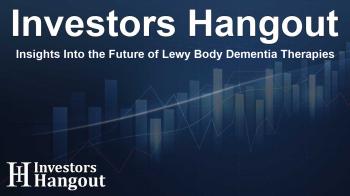Insights Into the Future of Lewy Body Dementia Therapies

Understanding Lewy Body Dementia and Its Impact
The Lewy body dementia (LBD) market is on the brink of transformation, driven by the introduction of innovative therapies and increasing healthcare investments. The need for effective treatments is underscored by the significant challenges faced by patients with LBD, a complex neurological disorder characterized by the presence of abnormal alpha-synuclein protein in the brain, which contributes to cognitive decline, motor dysfunction, and psychiatric symptoms.
Current Market Landscape
In recent years, the number of diagnosed dementia cases has surged worldwide. With the reported figure of 12 million cases in various regions, there is a rising demand for comprehensive treatment solutions. Particularly notable is the US market, which highlights the critical need for advanced diagnostic tools and effective therapies. In this context, therapies such as Neflamapimod, Zervimesine, and Nilotinib are gaining attention for their potential to alter treatment paradigms.
Symptoms and Treatment Approaches
Patients suffering from LBD experience a unique constellation of symptoms, including cognitive dysfunction, visual hallucinations, and fluctuating attention. These symptoms often co-occur with motor symptoms similar to those seen in Parkinson's disease, leading to a complex clinical picture. Current treatments primarily aim to alleviate these symptoms but do not address the underlying disease process. There is a pressing need for therapies that can simultaneously target multiple aspects of LBD, enhancing the overall quality of care for patients.
Emerging Therapies and Their Potential
The development pipeline for LBD treatments remains relatively sparse, emphasizing the critical need for innovation. Investigational drugs like Neflamapimod have received positive attention, demonstrating a favorable safety profile and promising outcomes in early trials. With fast-track designation by regulatory authorities, this therapy holds potential for addressing the unmet medical needs of LBD patients.
Advancements in Research and Development
CervoMed, the developer of Neflamapimod, has a strong commitment to advancing its investigational therapies. The company is bolstering its development efforts by making strategic hires and enhancing production capabilities, allowing for future scalability as regulatory approvals are pursued. Similarly, Zervimesine and Nilotinib are under investigation for their roles in treating different LBD subtypes, particularly focusing on modulating cognitive and motor symptoms, signaling a growing recognition of the complexities inherent in LBD treatment.
Challenges in Diagnosis and Management
One of the significant challenges in managing LBD is the lack of reliable biomarkers for diagnosis during a patient's lifetime. Current diagnostic practices often rely on clinical evaluations, which can lead to misdiagnosis or delays in appropriate treatment. The pursuit of validated biomarkers is crucial in enhancing early diagnosis, streamlining patient identification for clinical trials, and ultimately accelerating the advancement of targeted therapies.
Future Directions in the Lewy Body Dementia Market
As the Lewy body dementia market continues to evolve, there is promising potential for the launch of new therapies that could redefine care standards. The anticipated rise in awareness and advancements in diagnostic capabilities will likely contribute to significant market growth. Investment in research targeting alpha-synuclein pathology is gaining momentum, with increasing regulatory support further encouraging therapeutic development in this underestimated area of neurodegeneration.
The Role of Market Reports
Comprehensive market reports provide insights into ongoing trends and opportunities in the Lewy body dementia landscape. Analyzing historical and projected epidemiology assists stakeholders in understanding patient populations and markets, enabling better strategic decisions. The reports indicate which therapeutic developments are likely to capture significant market shares and identify key players poised to lead in this critical segment of healthcare.
Frequently Asked Questions
What is Lewy body dementia?
Lewy body dementia is a progressive neurological disorder characterized by cognitive decline, motor symptoms, and psychiatric disturbances due to abnormal protein deposits in the brain.
What are the major symptoms of LBD?
Symptoms include cognitive impairment, visual hallucinations, Parkinson-like motor symptoms, and fluctuating attention levels.
What therapies are currently in development for LBD?
Emerging therapies such as Neflamapimod, Zervimesine, and Nilotinib are being investigated for their potential to treat various symptoms of LBD.
Why is early diagnosis critical for LBD?
Early diagnosis allows for timely interventions, better management of symptoms, and effective participation in clinical trials for new therapies.
How does the market for LBD treatments look for the future?
The market is expected to experience significant growth, driven by the introduction of new therapies, improved diagnostic methods, and an increasing patient population.
About The Author
Contact Ryan Hughes privately here. Or send an email with ATTN: Ryan Hughes as the subject to contact@investorshangout.com.
About Investors Hangout
Investors Hangout is a leading online stock forum for financial discussion and learning, offering a wide range of free tools and resources. It draws in traders of all levels, who exchange market knowledge, investigate trading tactics, and keep an eye on industry developments in real time. Featuring financial articles, stock message boards, quotes, charts, company profiles, and live news updates. Through cooperative learning and a wealth of informational resources, it helps users from novices creating their first portfolios to experts honing their techniques. Join Investors Hangout today: https://investorshangout.com/
The content of this article is based on factual, publicly available information and does not represent legal, financial, or investment advice. Investors Hangout does not offer financial advice, and the author is not a licensed financial advisor. Consult a qualified advisor before making any financial or investment decisions based on this article. This article should not be considered advice to purchase, sell, or hold any securities or other investments. If any of the material provided here is inaccurate, please contact us for corrections.

